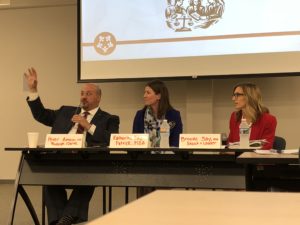PSBA asks Rudolph Clarke to speak at annual Pupil Transportation Symposium

The Pennsylvania School Boards Association held their annual Pupil Transportation Symposium at headquarters in Mechanicsburg on June 20th, and Rudolph Clarke Partner Peter Amuso was asked to speak on their legal panel. Peter was a Contributing Editor to the Pennsylvania School Law Handbook, 11th Edition. He focuses his practice on education law, including labor law matters and union contract negotiations. Peter was elected to the School Board of Springfield Township (Montgomery County) in 2005 and served as Chair of the Property Committee during a period of major school construction.
The PSBA panel addressed legal considerations regarding school transportation, such as homelessness, special education (IDEA), shared custody situations, and how to effectively coordinate/navigate transportation contracts.
The panel explained that under the McKinney-Vento Act of 1987, school districts are required to provide transportation to homeless students. The Act places emphasis on removing barriers created by homelessness in order to provide homeless students with equal opportunities for education. Similarly, the Individuals with Disabilities Education Act (IDEA) ensures that students with a disability are provided with Free Appropriate Public Education (FAPE) with attention to their specialized needs. A school district is required to provide transportation to individuals covered by both of these Acts.
Responding to concerns surrounding shared custody situations, the panel referenced two precedential cases: the ruling of Wyland v. West Shore School District (2012) established that it is possible for a child to have two residences; in Watts v. Manheim School District (2015), it was found that the district was required to provide transportation to both parent’s residences. However, in both the Watts and Wyland case, the rulings hold only if the custody is equally shared and both parents reside in the district.
The school district is responsible for providing transportation to its students, whether they provide it themselves or contract it out. The panel suggested that the best way to approach transportation contracts is to include clear expectations of responsibilities and procedures (of the district and of the company). The district may want to include their ability to selectively choose their drivers, and transportation companies may want to include procedures for and channels of communication.
The ultimate goal of both a school district and a transportation company is to get students safely to and from school, so it is important to be aware of and understand the laws and regulations that serve to protect and advise students, parents/guardians, and administrators.

